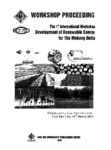Please use this identifier to cite or link to this item:
http://thuvienso.bvu.edu.vn/handle/TVDHBRVT/14544Full metadata record
| DC Field | Value | Language |
|---|---|---|
| dc.contributor.author | Nguyễn, Chí Thuần | - |
| dc.contributor.author | Nguyễn, Quang Long | - |
| dc.contributor.author | Hoàng, Ngọc Hà | - |
| dc.date.accessioned | 2016-06-01T02:17:43Z | - |
| dc.date.available | 2016-06-01T02:17:43Z | - |
| dc.date.issued | 2016-03 | - |
| dc.identifier.uri | http://thuvienso.bvu.edu.vn/handle/TVDHBRVT/14544 | - |
| dc.description.abstract | As usual, industrial process systems operate far from (stable) equilibrium. Under practical conditions when putting the system back in equilibrium, this gives rise to the loss o f energy (or certain generalized energy). Following the second law o f thermodynamics, an irreversibleprocess generates entropy. On the basis o f this property, we propose an approach that allows to investigate quantitatively the amount o f (generalized) energy’lost when the system reaches equilibrium. A liquid phase reactor modelled with the CSTR (continuous stirred tank reactor) in which the acid-catalyzed hydration o f 2-3-epoxy-l- propanol to glycerol subject to steady state multiplicity takes place is used to illustrate the results. | vi |
| dc.language.iso | en | vi |
| dc.relation.ispartofseries | Can Tho University;March 2016, tr128-138 | - |
| dc.subject | Entropy | vi |
| dc.subject | Energy | vi |
| dc.title | On the Dissipation and Its Relation to Irreversible Processes | vi |
| dc.type | Article | vi |
| Appears in Collections: | Kỷ yếu - Hội thảo | |
Files in This Item:
| File | Description | Size | Format | |
|---|---|---|---|---|
| Nguyen-Chi-Thuan.pdf | 2,32 MB | Adobe PDF |  Sign in to read |
Items in DSpace are protected by copyright, with all rights reserved, unless otherwise indicated.